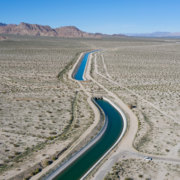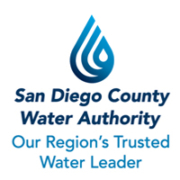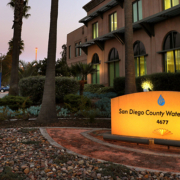The San Diego County Water Authority’s Board of Directors today authorized staff to launch the next phase of a study assessing options for long-term water deliveries to sustain the region’s economy and quality of life.
The decision follows months of community dialogue about Phase A of the Regional Conveyance System Study, which was released in August. The study demonstrated the technical viability and economic competitiveness of two routes for an aqueduct to transport the Water Authority’s independent, high-priority Colorado River water to San Diego County.
Over the next 15 to 18 months, Water Authority staff will undertake Phase B, focusing on economic analysis of the two conveyance route alternatives and exploring partnerships that could provide significant benefits to an array of stakeholders and potentially reduce the cost of project development. At the end of Phase B, the 36-member Board will again decide whether to continue with regional conveyance project planning – and if so, how to proceed.
Long-term planning
“These issues are complex and the decisions never easy, but the Board chose today to keep all water supply and delivery options on the table in light of future uncertainties,” said Gary Croucher, chair of the Water Authority’s Board of Directors. “I look forward to learning from Phase B and working with the Board to decide on next steps when that study phase is done. We also look forward to working with MWD in coming months to explore long-term options for continued use of its Colorado River Aqueduct.”
The Water Authority is the long-term water planning agency for metropolitan San Diego County and the region’s wholesale water provider, serving 3.3 million people and a $245 billion economy in partnership with its 24 retail member agencies.
Half of the Water Authority’s supplies are from two landmark 2003 water conservation agreements – one that boosted water-use efficiency in collaboration with the Imperial Irrigation District and another to line sections of the All-American and Coachella canals with concrete to reduce seepage. Both agreements are part of the 2003 Quantification Settlement Agreement, the largest ag-to-urban water transfer in U.S. history.
Water supply reliability
Conserved water from the QSA is transferred to San Diego County through an Exchange Agreement with the Los Angeles-based Metropolitan Water District of Southern California. MWD owns the only facilities available to transport Colorado River water to San Diego County. The cost of using MWD facilities to deliver the Water Authority’s QSA water has increased 30% over the past five years alone.
The Water Authority’s Exchange Agreement with MWD ends in 2047, and the Water Authority is working to develop conveyance alternatives in order to manage future cost and risks.
“While 2047 may seem distant, major water infrastructure projects take decades to develop, plan and build,” said Croucher. “By advancing to Phase B of the conveyance study, the Water Authority is taking prudent steps to ensure long-term water supply reliability for the region.”
In order to address the cost and risk uncertainties associated with the use of MWD facilities, the Water Authority’s Board in June 2019 approved a study of the viability of a new regional conveyance system that would deliver water from the Colorado River to San Diego County and also might provide multiple benefits across the Southwest. Three potential pipeline routes were studied in Phase A, which concluded in August 2020 that two alternatives (3A and 5A) are cost-competitive with other options, such as continued use of MWD facilities.
Water Authority staff and consultants began in August an extensive series of briefings and outreach on Phase A results and consultant reports. The Board’s goal was to ensure a full exchange of information and viewpoints in a transparent process. Outreach across numerous platforms engaged member agencies, other local stakeholders, the Imperial Valley, and Borrego Springs.
Partnership opportunities
With today’s Board vote to approve Phase B, Water Authority staff will focus for the next several months on economics, partnerships, legal analysis, and stakeholder outreach. Phase B will help address questions about mitigating short-term rate impacts of a project, the benefits of potential partnerships and funding opportunities, developing a plan of finance and the requirements of existing agreements, as well as explore with MWD options for long-term water deliveries to the San Diego region using MWD facilities.
MWD issues to be addressed will include analysis of:
- Historic and projected future increases in MWD’s water rates and charges
- MWD’s current planning assumptions
- Costs and water yield of MWD’s current and planned projects
- Future demand for MWD water
- Other MWD rate drivers
Phase B will apply the same rigorous analysis to Water Authority rate and cost projections. Water Authority staff will also begin the process of engaging more formally with stakeholders on potential partnership projects identified in Phase A, including public-private-partnerships, bi-national projects, renewable energy projects, regional operational storage projects, Salton Sea-related projects, and partnerships with tribes, federal and state governments, and member agencies.
For more details, go to sdcwa.org/colorado-river-supplies-management.






